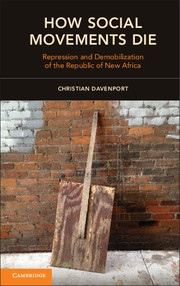Book contents
- Frontmatter
- Dedication
- Contents
- Tables
- Figures
- Acknowledgments
- Introduction
- Part I Theory
- Part II CASE
- Part III ORIGINS
- Part IV Examination
- 7 Birth of a Black Nation
- 8 To Ocean Hill–Brownsville and B(l)ack
- 9 New Bethel and the End of the Beginning
- 10 When Separatists Separate
- 11 Mississippi
- Part V CONCLUSION
- References
- Index
10 - When Separatists Separate
Published online by Cambridge University Press: 05 December 2014
- Frontmatter
- Dedication
- Contents
- Tables
- Figures
- Acknowledgments
- Introduction
- Part I Theory
- Part II CASE
- Part III ORIGINS
- Part IV Examination
- 7 Birth of a Black Nation
- 8 To Ocean Hill–Brownsville and B(l)ack
- 9 New Bethel and the End of the Beginning
- 10 When Separatists Separate
- 11 Mississippi
- Part V CONCLUSION
- References
- Index
Summary
The aftermath of the New Bethel Incident was mixed for the RNA. On one hand, the overt repressive activity exerted at the anniversary and that experienced afterward galvanized the black community around the dissident organization as a group of African Americans trying to improve their situation had been treated coercively by the U.S. government – something that blacks in Detroit (and throughout the United States) were quite familiar with by that time. At a level not previously experienced, this situation brought all types of individuals and organizations to speak on the RNA’s behalf, including C. L. Franklin (the pastor of the church that hosted the ill-treated RNA meeting) and even the NAACP (although there was clearly no love lost between the two organizations). As the white police department and their supporters slandered and seriously questioned the black judge Crockett, who had participated in freeing New Bethel attendees arrested after the raid, the black community was brought closer to the RNA, if only in an awkward moment of mutual hostility toward anglos with guns.
On the other hand, the overt and covert repressive activity of and following the event led to a series of problems for the RNA. For example, there was a national search for the killer of one police officer and the shooter of another within the organization, which increased government scrutiny and harassment of members. According to newspaper articles and government committee testimony, the RNA was subject to a wide variety of domestic spying, including physical surveillance and informants. Later, there was a series of trials for those allegedly involved in the shootings, that is, Alfred Hibbitt (or Alfred 2x; slave name: Sam Love, an RNA member from Detroit), Rafael Viera (an RNA member from New York), and Clarence Fuller (an RNA member from Detroit). As if this were not enough, on the heels of these events, Robert F. Williams (the exiled president of the RNA) finally came back to Detroit on September 7, 1969. Although it was believed by many that his return would assist the RNA, shoring up its connections with other black organizations and compelling greater coherence around one of, if not the most prominent, black nationalist leaders in the United States, his return was actually highly disappointing and a bit divisive as he became consumed with the details of his potential extradition to North Carolina on an earlier kidnapping charge. With the realization that Williams would not lead the RNA, a series of events occurred that would significantly cripple the dissident organization, leading to Imari Obadele’s suspension as well as the development of a faction dividing the RNA between the two Obadele brothers, who differed in their approaches regarding what should be done.
- Type
- Chapter
- Information
- How Social Movements DieRepression and Demobilization of the Republic of New Africa, pp. 245 - 271Publisher: Cambridge University PressPrint publication year: 2014



